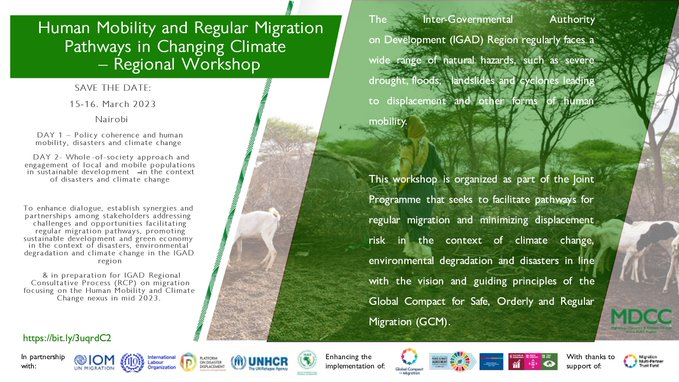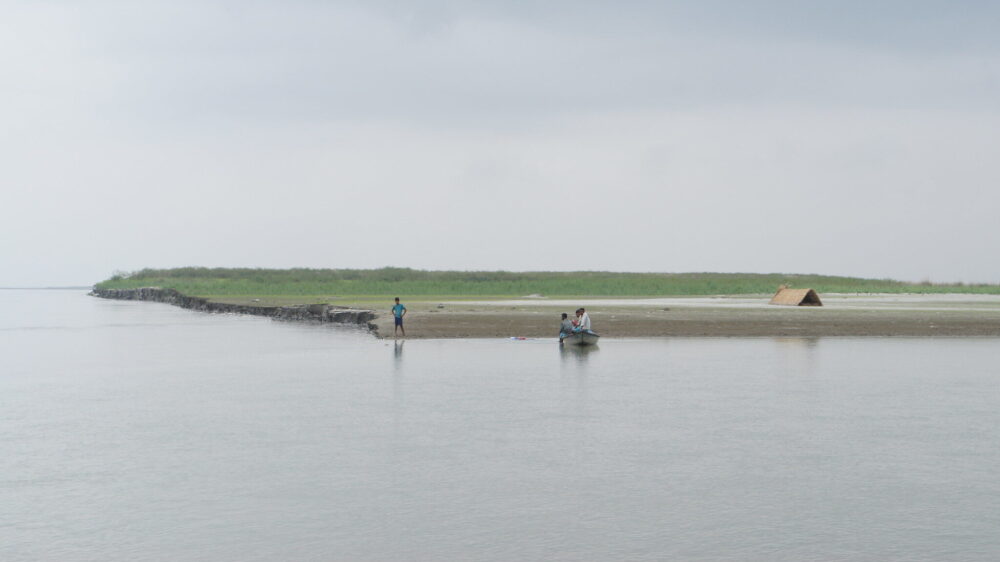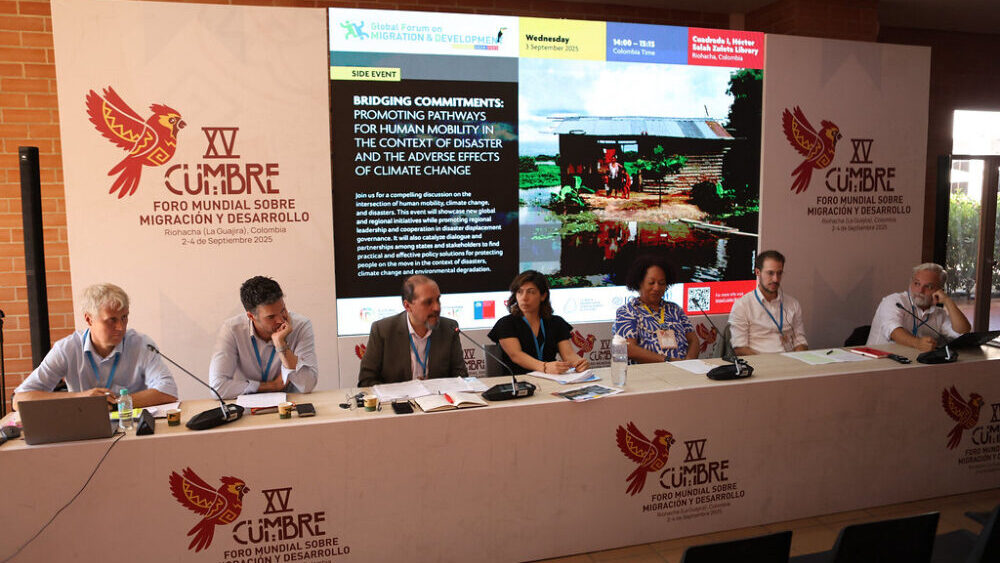Regional Workshop – Human Mobility and Regular Migration Pathways in Changing Climate

Regional Workshop – Human Mobility and Regular Migration Pathways in Changing Climate
15-16 March 2023
Nairobi, Kenya and online
1. Background
The Intergovernmental Authority on Development (IGAD) is one of the eight Regional Economic Communities of the African Union, comprising the Member States of Djibouti, Eritrea, Ethiopia, Kenya, Somalia, South Sudan, Sudan and Uganda. It is home to more than 230 million people whose livelihoods and income are predominantly linked to agriculture. The IGAD region is one of the most diverse regions in the world, including areas of economic growth and investment on the one hand, and areas prone to violent conflict, political instability, humanitarian crises, and disasters linked to the adverse effects of climate change and environmental degradation on the other.
In the African continent, the IGAD region is considered one of the most vulnerable to climate variability and change and more than two thirds of the region is arid or semi-arid. It regularly faces a wide range of natural hazards leading to various forms of human mobility (displacement, migration and planned relocation), most commonly floods, but also landslides, and tropical cyclones, as well as slow-onset climate change effects, such as severe droughts, water level rise, environmental degradation, and rainfall variability.
The different forms of human mobility to, from, and within the IGAD region reflect the range of complex drivers and structural factors that can compel people to leave their places of origin. Disasters linked to natural hazards, environmental degradation, and the adverse effects of climate change are amongst the most important and overlapping drivers of human mobility. Individual migration decisions are often based on a combination of these environmental and other economic, political, social, and demographic drivers.
The implementation of planned and well-managed migration policies can have a positive contribution on development and protection of those moving or being compelled to move, the risk of which can be reduced or mitigated through regular pathways for migration, integrated approaches to disaster risk reduction, climate action and measures to support decent work, livelihoods and migration as an adaptation strategy.
The Global Compact for Migration (GCM) and the SDGs recognize that no country can address the challenges and opportunities of human mobility on its own as it is a multidimensional challenge for the sustainable development of countries of origin, transit and destination – nor can it be addressed by any single policy sector alone. In a coordinated regional approach, the AU developed a 3-year Implementation Plan of Action for GCM (2020-2022)[1][1]. The Action Plan sets a number of eight priorities for GCM implementation. The 7th priority identifies four actions to minimize the adverse effects of climate change, natural disasters and environmental degradation that compel people to leave their country of origin.
IGAD Regional Strategy Frameworks acknowledge that mobility is both an opportunity and a concern to development in the region. IGAD has undertaken different activities addressing human mobility in the context of disasters and climate change in the region. In 2014, a Regional Consultation on disasters, climate change and cross-border displacement was held in Nairobi, where Ministers adopted recommendations for future action. Building on this dialogue, in 2017, the Regional Consultative Process on Migration (RCP) brought together IGAD Member States, UN organizations and other relevant stakeholders to continue the discussion on human mobility in the context of disasters and climate change.
On 25 May 2021, the Participating United Nations Organizations (PUNOs): the International Organization for Migration (IOM), the International Labour Organization (ILO), the Platform on Disaster Displacement (PDD) (hosted under United Nations Office for Project Services (UNOPS), and the United Nations High Commissioner for Refugees (UNHCR) and partners, the Intergovernmental Authority on Development (IGAD) Secretariat including the IGAD Climate Prediction and Application Centre (ICPAC) launched the first regional Joint Programme “Addressing drivers and facilitating safe, orderly and regular migration in the context of disasters and climate change in the IGAD region” , funded by the Migration Multi-Partner Trust Fund (MPTF).
The overall objective of this Joint Programme is to contribute to facilitating pathways for regular migration in the IGAD region and minimizing displacement risk in the context of climate change, environmental degradation and disasters in line with the vision and guiding principles of the Global Compact for Safe, Orderly and Regular Migration (GCM). In particular, the Joint-Programme aims to improve regional and national migration governance in the context of the adverse impacts of climate change and environmental degradation through different actions that each address the relevant objectives of the GCM and contribute to the implementation of other relevant international instruments, Sustainable Development Goals, the 2015 Paris Agreement under the United Nations Framework Convention on Climate Change (UNFCCC) and the Sendai Framework for Disaster Risk Reduction 2015-2030. It also takes forward the IGAD Protocol on Free Movement of Persons.
The Joint Programme is producing evidence in areas ranging from disasters displacement, cross-border movements and international protection to the promotion of human and labour mobility and the development of green economies in climate change and disaster-prone areas. Through these interventions, the IGAD Member States will have access to up-to-date, high quality data and evidence on different forms of human mobility. It promotes whole-of-government and whole-of-society approaches in policymaking and implementation.
In July 2022, the Government of the Republic of Uganda, spearheaded by the Ministry of Water and Environment, was supported by the IOM Regional Office for East and Horn of Africa and the United Nations Framework Convention on Climate Change (UNFCCC)’s Regional Collaboration Centre (RCC) based in Uganda, to organize a High-level, Regional, Inter-Ministerial Conference on “Migration, Environment and Climate Change (MECC) in the East and Horn of Africa”. The MECC Conference brought together Ministers of Environment, Interior and Foreign Affairs and their technical experts from the 12 countries in the East and Horn of Africa Region that are members of either the East African Community (EAC) and/or the Intergovernmental Authority on Development (IGAD), as well as other African Member States such as Egypt as COP-27 Presidency, Senegal as current Presidency of the African Union, Zambia as the Chair of the African Group of Negotiators, Kenya as the Head of the Committee of African Heads of State and Government on Climate Change (CAHOSCC), and high-Level representatives of the African Union Commission, the IGAD and the EAC and Youth representatives from the region. A landmark, ‘Kampala Ministerial Declaration on MECC” was agreed upon by 3 Ministries- Environment, Interior and Foreign Affairs and signed by 15 Member States, demonstrating the urgency and whole of government prioritisation that leaders in the region and on the African continent, place on this topic.
It is in this light that the partners will facilitate a workshop inviting participation from a wide range of policymakers and stakeholders in the IGAD region to share findings from the Joint Programme.
The workshop is organized by: the International Organization for Migration (IOM), the United Nations High Commissioner for Refugees (UNHCR), the International Labour Organization (ILO), the Platform on Disaster Displacement (PDD) (hosted under United Nations Office for Project Services (UNOPS)), the Intergovernmental Authority on Development (IGAD), the IGAD Climate Prediction and Application Centre (ICPAC).
This workshop offers an opportunity to discuss regional integration and policy coherence, as well as to seek synergies with on-going and future interventions and to identify partnership opportunities and priority areas of action in the intersection of human mobility, protection, green economy and climate change in supporting local, national and regional state actors in a coordinated manner.
The findings from the programme and ensuing discussion coming out of the workshop also provide an opportunity for ground truthing policy development by feeding the up-to-date evidence back into the regional and national migration coordination platforms such as the Regional Migrant Response Plan, the National Coordination Mechanism on Migration (NCM) and the Regional Consultative Process on Migration (RCP).
2. Objective of the workshop
The workshop aims at engaging policymakers in the IGAD region with knowledge, experience or interest in the intersection of human mobility, protection, green economy and climate change.
The objective of the workshop is multi-fold;
- To enhance understanding of human mobility dimensions, including labour mobility, in the IGAD region in the context of changing climate, and the complexity of the relationship between human mobility and climatic and environmental events, paying particular attention to the impact on protection and access to sustainable livelihoods;
- To enhance dialogue, establish synergies and partnerships among stakeholders and addressing challenges and opportunities facilitating regular migration pathways, ensuring protection, promoting sustainable development, access to decent work and green economy in the context of disasters, environmental degradation and climate change in the IGAD region, in line with the vision and guiding principles of the GCM;
- To take stock of existing interventions implemented in the IGAD region related to human mobility and green economy, including efforts to support just transitions to environmentally sustainable economies, and their lessons learnt and best practices;
- To explore the priority needs and gaps for future programming.
3. Outcomes expected from workshop
The workshop aims to achieve increased understanding of:
- whole-of-society and whole-of-government approaches and policy coherence in enhancing climate action in the IGAD region;
- the regular migration opportunities;
- Promotion of green jobs and just transitions towards environmentally sustainable economies
- the effectiveness and efficiency of programming on human mobility in the context of disasters and climate change in the region.
4. Structure, format and participation
Workshop
- The partners will organize a two-day in-person workshop in Nairobi, Kenya.
- There will be an opportunity to participate online, via Teams platform. (TBC)
- The workshop will be hosted jointly by the programme partners.
Consent
- Participation in the workshop is voluntary.
- Photographs will be taken, and sessions might be recorded.
- By participating, the participants accept that photos will be taken, and the workshop will be recorded. Photos will be utilized in public information materials.
Language
- The workshop will be run in English for all sessions (TBC)
Participation
- Member states and their representatives in the field of human mobility, climate change action, disaster risk reduction, protection, representatives of national and regional partners and focal points.
- IGAD MS – programme counterparts
- IGAD MS Focal Points – National Coordination Mechanisms on Migration (NCM)
- Migrants and local community leaders.
- Youth representatives.
- Key partners and stakeholders, international organizations, non-governmental organizations, private sector, academia, trade unions, employers organizations.
- The invitations will be shared via email.
Registration
- Partners will be asked to confirm their participation in advance.
COVID-19 measures
The measures for the COVID-19 pandemic will be observed and followed in the preparation and implementation of the workshop.
[1] https://au.int/sites/default/files/newsevents/workingdocuments/37472-wd-3_year_implementation_plan_of_action-english.pdf
Useful Links
Download the workshop concept note and agenda
Read the press release
Learn more about the Migration Multi-Partner Trust Fund




